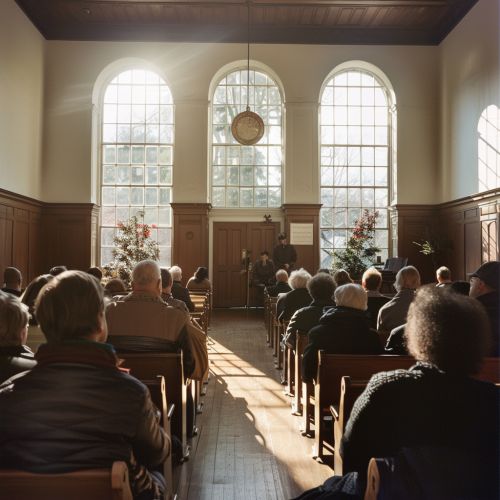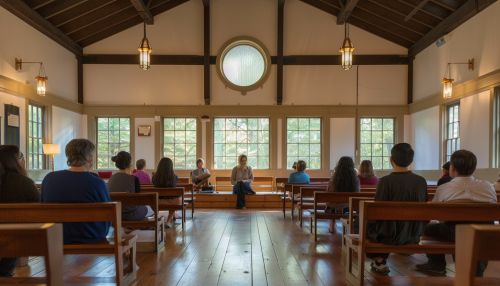Quakers
History of Quakers
The Quakers, formally known as the Religious Society of Friends, emerged in mid-17th century England during a period of religious and political turmoil. The movement was founded by George Fox, who, after a spiritual awakening, began to preach a message of direct, personal experience of God without the need for clergy or sacraments. This message resonated with many who were disillusioned with the established Church of England and other religious institutions of the time.
Quakerism spread rapidly, despite facing severe persecution from both religious and governmental authorities. Early Quakers were often imprisoned, fined, and subjected to physical violence for their beliefs and practices, which included refusing to take oaths, pay tithes, or serve in the military. Despite these challenges, the movement grew and eventually established a significant presence in England, Wales, Ireland, and the American colonies.


Beliefs and Practices
Quaker beliefs are characterized by a focus on the Inner Light, or the presence of God within each individual. This belief leads to an emphasis on personal spiritual experience and a direct relationship with the divine. Quakers reject formal creeds and hierarchical structures, instead valuing simplicity, equality, and community.
Quaker worship is typically conducted in meetings for worship, which can be either unprogrammed or programmed. In unprogrammed meetings, participants gather in silence, waiting upon the Inner Light to inspire vocal ministry. In programmed meetings, there may be a more structured service with hymns, readings, and a sermon.
Quakers are also known for their commitment to pacifism, social justice, and humanitarian work. They have historically been involved in movements for the abolition of slavery, women's rights, and prison reform. The Quaker testimonies of simplicity, peace, integrity, community, equality, and stewardship guide their actions and interactions with the world.
Organizational Structure
The organizational structure of the Religious Society of Friends is unique and reflects their commitment to equality and community. Local congregations, known as monthly meetings, are the basic unit of Quaker organization. These meetings are responsible for the spiritual and practical affairs of their members.
Monthly meetings are grouped into larger bodies called quarterly meetings and yearly meetings, which provide oversight and support. Decisions are made through a process of consensus decision-making, seeking unity rather than majority rule. This process is seen as a way to discern the will of God collectively.
Quaker Contributions to Society
Quakers have made significant contributions to various social causes throughout history. Their commitment to abolitionism was evident in their active participation in the Underground Railroad and other efforts to end slavery. Quakers like John Woolman and Lucretia Mott were prominent abolitionists who advocated for the rights and dignity of enslaved people.
In the realm of women's rights, Quakers were early supporters of gender equality. Many Quaker women, including Susan B. Anthony and Alice Paul, played crucial roles in the women's suffrage movement in the United States.
Quakers have also been involved in prison reform, advocating for humane treatment and rehabilitation of prisoners. The Philadelphia Society for Alleviating the Miseries of Public Prisons, founded by Quakers in 1787, was one of the first organizations dedicated to prison reform.
Quaker Education
Education has always been a priority for Quakers, who believe in the importance of nurturing both the intellect and the spirit. Quaker schools, such as Friends' Central School and Sidwell Friends School, emphasize values like integrity, simplicity, and social responsibility alongside academic excellence.
Quaker colleges and universities, including Haverford College, Swarthmore College, and Earlham College, are known for their rigorous academics and commitment to social justice. These institutions often incorporate Quaker principles into their curricula and campus life, fostering a sense of community and ethical responsibility among students.
Modern Quakerism
Today, Quakerism is a diverse and global faith community. While the core beliefs and practices remain consistent, there is considerable variation in how they are expressed. Some Quaker meetings are more traditional, maintaining the unprogrammed worship style and plain dress, while others are more liberal and open to contemporary influences.
Quakers continue to be active in social justice and humanitarian work, addressing issues such as climate change, racial equality, and peacebuilding. Organizations like the American Friends Service Committee and Friends Committee on National Legislation advocate for policies and practices that reflect Quaker values.
